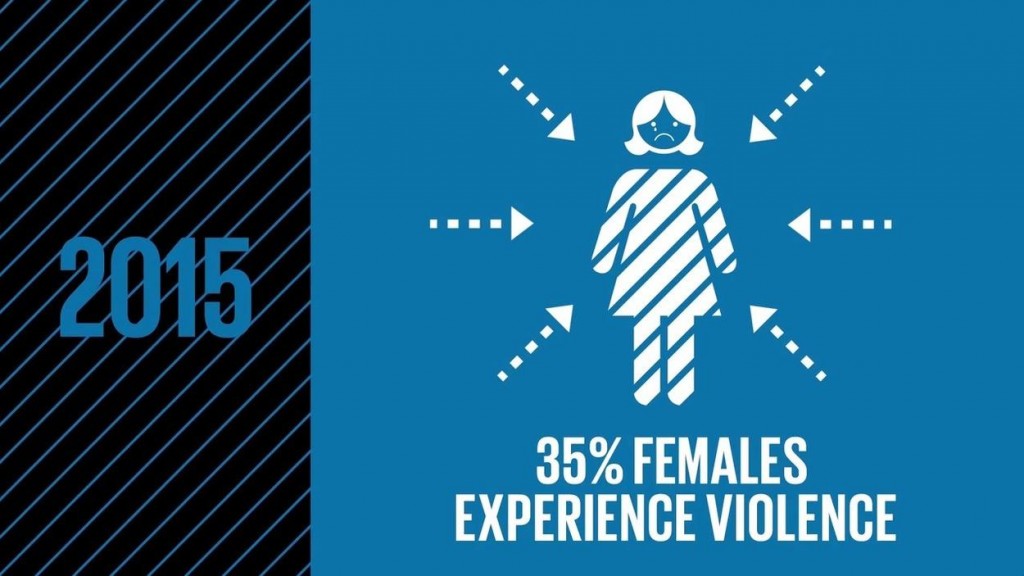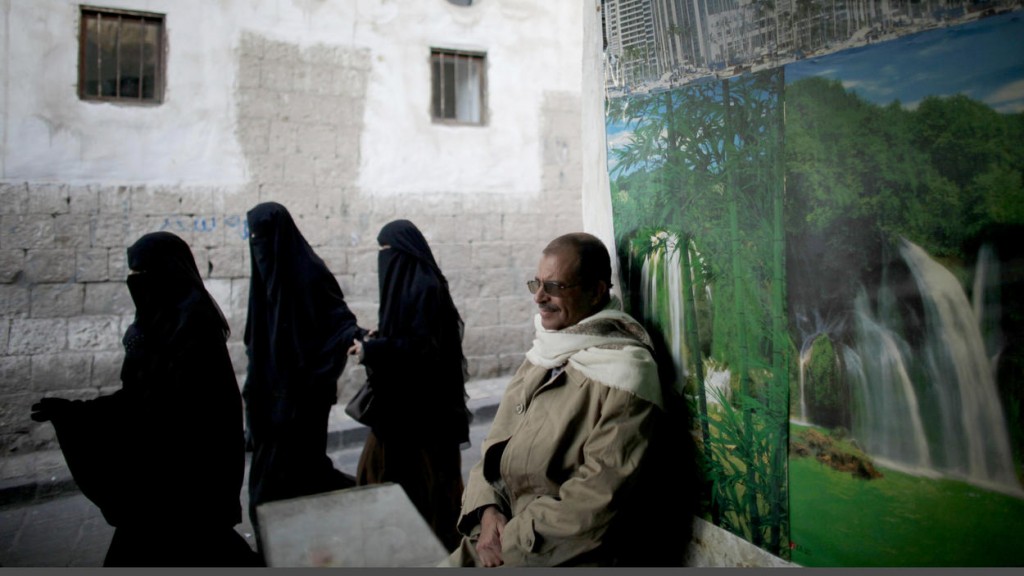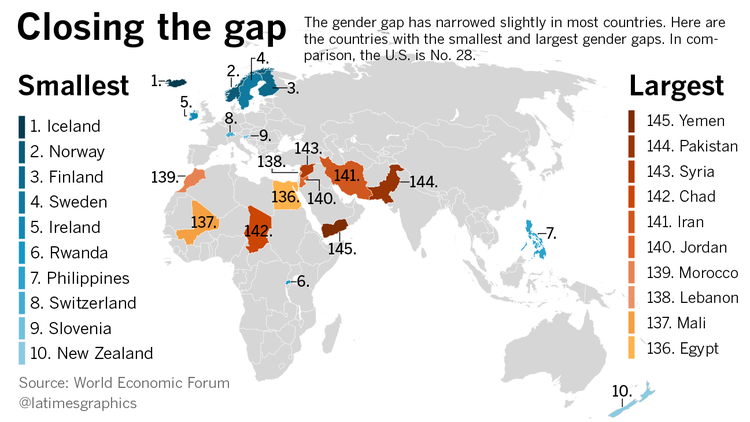It’s been more than 100 years since the world began observing International Women’s Day, and yet no country has achieved full gender equality.
“It’s very sobering to realize that it’s 2016 and we don’t have that yet,” said Daniela Ligiero, Vice President of Girls and Women Strategy at the United Nations Foundation.
Of 145 nations, Iceland has come closest in the realms of economic participation and opportunity, educational attainment, health and survival, and political empowerment, according to 2015 data from the World Economic Forum.
But in Yemen, the country that ranks lowest according to the same data, women are only considered half a witness in court cases and are forbidden to leave the house without their husbands’ permission. In Tanzania and Lesotho, women cannot inherit land. All around the world, 1 in 3 women will experience some kind of sexual violence or intimate partner violence in her lifetime, Ligiero said.
As several countries around the globe mark International Women’s Day today, here are a few key indicators depicting the status of women and some of the challenges that remain.
Education
About two-thirds of countries in the developing world have achieved gender equality in primary education according to U.N. data, but the progress is less substantial at the secondary school level.
In Africa and South Asia for example, boys remain 1.55 times more likely to complete secondary education than girls, according to World Bank data. Statistics from the U.N. Children’s Fund, UNICEF, show that in 2012 at least 19 countries had fewer than 90 girls for every 100 boys in school, with the greatest disparity in the Arab States and sub-Saharan Africa.
Even when girls make it into the classroom they still “continue to face particular risk in chaotic conflict settings,” said Nisha Varia, advocacy director for the women’s rights division of Human Rights Watch.
In Pakistan, for example, the Taliban has declared war on girls’ education, and frequently attacks educational institutions. In 2012, Pakistani Taliban gunmen shot education activist Malala Yousafzai, who was later awarded the Nobel Peace Prize.
In Nigeria, most of the 300 girls kidnapped by extremist militia Boko Haram in 2014 are still missing.
Employment
The obstacles to women’s upward mobility do not subside if they manage to attain academic qualifications.
“They don’t translate into greater equality in the labor market,” said Sarah Gammage, director of gender, economic empowerment and livelihoods at the International Center for Research on Women. “Around the world women have disproportionately been part of the informal economy.”
They are typically responsible for providing care services for family members, Gammage said. Other duties include child rearing, cooking, and other household chores. It is work for which they are not paid. Women perform three times more unpaid work than men, according to the U.N.’s 2015 Human Development Report.
“This has a huge impact in terms of the types of mobility women are allowed,” Ligiero said. “If you are spending up to eight, nine hours collecting water, caring for kids, how are you going to get an education or engage in some kind of activity that is actually paid?”
The absence of women from the paid labor market is hurting the world economy, development experts say. For example, if women were to play an identical role in labor markets to that of men, as much as $28 trillion, or 26%, could be added to global annual GDP by 2025, according to a September 2015 study by McKinsey Global Institute.
“That’s what we’re missing out on by not fully empowering women,” said Ligiero.

Legal, social and cultural restrictions
Legal restrictions also continue to hinder women’s upward mobility in many countries of the world.
Being able to make decisions, such as voting, owning land, and deciding whom to marry “is where we see the most significant difference between the least developed and developed countries,” said Varia.
In Tanzania, when a woman’s husband dies, the man’s clan appoints an administrator to deal with his estate, and that is typically not the wife, according to human rights advocates.
In Saudi Arabia, women are not permitted to drive and cannot open bank accounts without their husbands’ permission. In Iran, a prominent politician recently called for donkeys, monkeys and women to be kept out of parliament. Uganda forbids women to gain permanent custody of children after a divorce, and Vatican City remains the only country in the world where women cannot vote. That’s because only cardinals are allowed to vote for a new pope — and since women cannot become leaders of the Catholic Church this bars them, and men who are not cardinals, from the polling booth. It’s also illegal for women to get divorced in Vatican City.
Social and cultural norms also continue to stifle women’s progress, and the restrictions can be both dangerous and debilitating.
Honor killings, the traditional practice that allows the slaying of a family member who is believed to have brought dishonor on a family, claims thousands of women’s lives every year in South and Central Asia. Pakistani human rights NGOs estimate that there are about 1,000 honor killings every year, according to Human Rights Watch.

Some communities in Ghana practice the tradition of trokosi, where young girls are “gifted” to priests to atone for crimes, typically committed by a male family member, or to show gratitude for a blessing.
More than 700 million women alive today were married before their 18th birthdays, according to UNICEF. Of those, about 250 million were wed before age 15. Child brides are still common in West and Central Africa and South Asia, Ligiero said. This can lead to girls dropping out of school, experiencing early pregnancy and being at risk of domestic violence, women’s rights officials said.
In Pakistan and Afghanistan, women can be forced to marry to settle a feud, while in Morocco they can be forced to marry their rapists. Algeria and Tunisia give a pass to rapists if they wed their victims. Husbands in Lebanon can “legally” rape their wives because the law does not recognize the concept of spousal rape.
In Kenya’s Luo community, women can be subject to wife inheritance. The age-old practice where a brother weds the widow of his brother has been blamed for contributing to the spread of HIV/AIDS.
Reproductive rights
A lack of reproductive rights and control over sexual health remains one of the most problematic areas for women in many countries.
In El Salvador, where abortion is outlawed, a woman can be jailed for having a miscarriage or stillbirth.
Female genital mutilation continues to plague women and girls. At least 200 million people alive today have undergone the procedure in 30 countries, according to a recent UNICEF report. Half of all the girls and women who have been cut live in Egypt, Ethiopia and Indonesia, and girls 14 and younger represent 44 million of those who have undergone the mutilation, according to the agency’s data.
Mortality rates for pregnant women are also startling. For example, an African woman faces a 1 in 31 chance of dying during childbirth whereas in the developed world that statistic is 1 in 4,300, according to Ligiero of the U.N. Foundation.
“There have been significant strides in several areas and huge challenges and pushback in others,” said Varia. “Women’s rights remain a struggle.”


